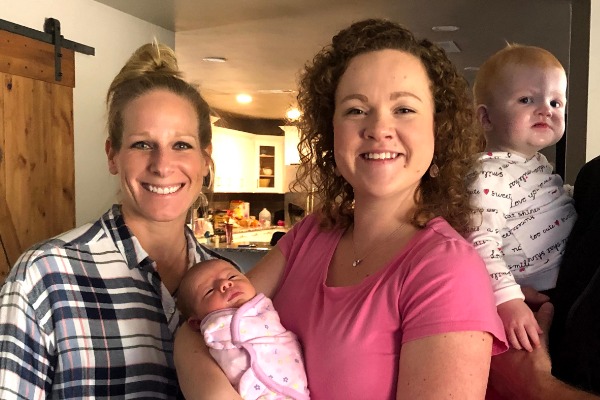Can You Give Your Child Up to the State?
4 Ways to Give Your Child the Support and Love They Need
If you’re wondering if you can give your child up to the state because parenting has become challenging, you have 4 options:
-
Respite foster care
-
Voluntary relinquishment
-
Temporary guardianship and relative adoption
-
Private infant adoption
We may be able to help. Call 1-800-ADOPTION now to get information based on your individual situation.
Parenting is hard. It can seem like there are new challenges every day, and it’s normal for parents to be overwhelmed at certain times during their child’s life.
This is a very serious question to voice, and it usually is a sign of great distress from a parent. It is not, however, a sign that you are a bad parent. Good parents recognize what is best for their children.
If you are wondering how to give up your child to the state, it is likely because you know you are not providing everything your child needs — and, out of love, you are actively looking for those resources, wherever they may be.
But, before giving a child up to the state, there are some important things you need to know first.
Consider Your Emotions
If you are thinking about giving a child up to the state, it’s important to recognize where your feelings are coming from. Are you simply overwhelmed at this point in your child’s life? Or are these concerns you’re having a symptom of a bigger issue?
No one can answer these questions but you — but our counselors are always here to help. Our professionals specialize in private adoption, which means they can provide counseling and support for people who are contemplating placing a newborn, infant, or toddler (in some cases) with another family.
These counselors can:
- Help you identify your concerns about raising your child
- Help you determine what the best path is for you moving forward
- Offer resources to help you make that decision a reality
For help placing a newborn or infant for adoption, please call our counselors at 1-800-ADOPTION to get free information at any time.
It’s normal for parents to worry that they are not doing the best for their children, and feelings of “not wanting” your children are actually more common than you think. We encourage that all parents in this situation seek out counseling, therapy and other local resources before making any life-changing decisions for themselves and their children.
Your Options for “Giving a Child Up” to the State
If you have consulted all of your resources and decided that parenting is not in the best interest of you or your child, you probably want to know about the options available to you. You may have a few questions, like:
Can you give up your child to the state?
I don’t want my child anymore — can Child Welfare come and get them?
How can I go about giving a child up to CPS?
These are all valid questions to have if you are considering giving up your child to the state. However, the process of placing a child within state custody is a bit more complicated than simply dropping your child off with a social worker.
The paths for placing a child in state custody vary state by state. What is possible in one state may not be in another. In addition, different state agencies have different amounts of resources and funds available to them — which means that they may not have space or resources to take a voluntary placement at a given time.
We encourage you to contact your local Department of Social Services or Department of Families and Children to find out which options are available in your area. While the following should not be taken as legal advice, these are a few examples of ways people go about “giving a child up” to the state:
Helpful Information
1. Respite Foster Care
Respite foster care is usually a state-provided service reserved for foster families, but some states do provide this service to biological and adoptive parents who are in need of it.
For these families, respite care comes at a cost, typically more than you would pay a traditional babysitter. It is a way for parents to receive professional childcare at times when they need a break for one reason or another.
If you are interested in temporary care for your child without terminating your parental rights, respite care may be the right path for you.
2. Voluntary Relinquishment, a.k.a. “Refusal to Assume Parental Responsibility”
For most foster care cases, a state agency has determined a child is unsafe in the parent’s home, and the child is removed involuntarily.
On the other hand, a refusal to assume parental responsibility (RAPR) is a voluntary relinquishment of a child into state custody. Often, this occurs because a parent decides they cannot provide the safe, supportive environment their child needs.
These are usually complicated situations for both the surrendering parent and state authorities. A court will not allow you to sign over your parental rights in an RAPR, but they often cannot order you to take care of a child that you don’t feel you can keep safe.
In this case, your situation will proceed as any other Child Protective Services case. It will often be presented before a judge, and the state will, in essence, sue for the custody of your children.
You cannot just “give” your child up to the state; it must first be ruled that this choice is in the best interest of everyone involved.
This is not an option in every state. In some cases, you will retain parental rights while your child is placed in a conservatorship or a specialized home for any additional services they may need. Before considering this option in any more detail, speak to a family law attorney.
3. Temporary Guardianship or Relative Adoption
If you have thought about giving a child up to the state, you should consider the kind of life your child will have in state custody. Because many of these programs lack funds, resources and foster parents, your child likely won’t receive the kind of life you want for him or her. They may spend years moving between foster families, without ever being adopted by a forever family.
To avoid this future, you may consider a temporary guardianship or a more permanent relative adoption.
In a temporary guardianship, you will place your child with someone you know and trust for a short amount of time. This may give you the opportunity you need to better your situation or take a break from your current struggles.
After some time, you may find you are ready to take on the responsibilities of parenthood yet again. During a guardianship, you will retain your parental rights.
On the other hand, if you want to secure a safe, permanent future for your child, think about placing him or her with a trusted friend or family member. That way, you can still be an active part of your child’s life while giving them opportunities and support you may be unable to provide.
That said, do not go looking for a parent to adopt your child online. This is a very dangerous path to take, and you will not be able to ensure the safety of your child as you would with an adoption or family services professional.
4. Adoption Through a Private Agency
Finally, if you wish to avoid the unknowns of giving your child to the state, you may reach out to a local private adoption agency to find a home for your child. Certain infant adoption agencies will facilitate the placement of children up to a few years old, while there are other non-profit agencies that can assist you with the placement of older children.
“For all those mothers and mothers to be that are thinking of adoption, don’t be afraid of it. It’s a very loving decision. It will be hard, but at least this way the baby will live and have the life they deserve to have,” said Sandra, a mother who chose adoption for her child.
If you are considering placing an infant or toddler for adoption, you can contact adoption counselors for free at 1-800-ADOPTION at any time. They can talk you through your options and, when you are ready, help you start an adoption plan for you and your child. American Adoptions will always be here to support you during this difficult time.
If you are interested in infant adoption, American Adoptions has the resources, expertise and collective personal adoption experience to give you the support you need. Many of our staff have gone through the adoption process as birth parents themselves and understand what you’re going through.
When you choose American Adoptions, you will have access to:
-
Adoption financial assistance. Adoption will never come at any cost to you as the birth parent. Our financial assistance will cover pregnancy and medical costs as well as living expenses such as rent, utilities, transportation to doctor appointments, groceries, etc.
-
Total control over your adoption plan, including choosing the adoptive parents. You will be able to have peace of mind knowing who will be raising your child. Your adoption professional will present you with adoption profiles for you to choose from. Because we are a large, national adoption agency, you will have more profiles to look through with us than with anyone else.
-
Freedom to decide how much post-placement contact you’re comfortable with. Through open adoption, you will be able to stay in touch with your child and their adoptive family through texts, phone calls, emails, photos and even in-person visits.
If you have a child who is more than a few years old, we encourage you to contact your local state agency or an adoption attorney first. They can often refer you to appropriate adoption agencies for your needs in your area. If you would like to reach out to our agency, you can always get free information to learn more about your options or request to schedule a time to speak to an adoption specialist.
Adoption through an agency may seem overwhelming at first, but it can provide you and your baby many advantages, such as the opportunity to choose the family you want for him or her, as well as being able to maintain communication with your child through open adoption. It provides a guarantee of safety and love for your child in a way that giving up a child to the state often cannot.
If you are considering giving a child up to the state, remember that this is a life-changing decision. Before deciding which path is best for you, we encourage you to research all of your options, determine where your feelings are coming from, and take advantage of the resources available to you. Only once you do this can you make the best choice for you and your child.
Disclaimer
Information available through these links is the sole property of the companies and organizations listed therein. American Adoptions provides this information as a courtesy and is in no way responsible for its content or accuracy.








































